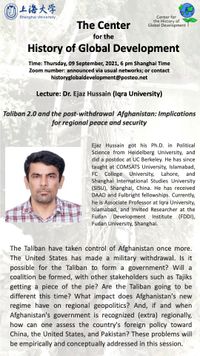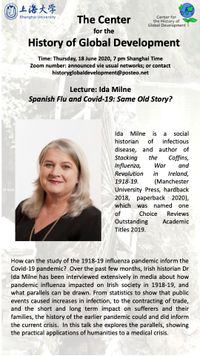PODCASTS
________________________________________________________________________________________________________________
Lecture: Ejaz Hussain
(Igra University ) - 9 September 2021
Taliban 2.0 and the post-withdrawal Afghanistan:
Implications for regional peace and security
The Taliban have taken control of Afghanistan once more. The United States has made a military withdrawal. Is it possible for the Taliban to form a government? Will a coalition be formed, with other stakeholders such as Tajiks getting a piece of the pie? Are the Taliban going to be different this time? What impact does Afghanistan's new regime have on regional geopolitics? And, if and when Afghanistan's government is recognized (extra) regionally, how can one assess the country's foreign policy toward China, the United States, and Pakistan? These problems will be empirically and conceptually addressed in this session.
Glenda Sluga
( Europe University Institute) - 13 May 2021
Climate and Capitalists, or the economic history of the 1972 UN Human Environment Conference
The lecture takes up the 1972 UN Human Environment conference: the first example of the attempted global governance of environmental issues and climate change that foundered on the challenges of development and North-South antagonisms. That history connects Delos, the ancient capital of the Athenian League, with the Club of Rome, and the New International Economic Order.
________________________________________________________________________________________________________________
Lecture: Ida Milne
(Carlow College) - June 18, 2020
Spanish Flu and COVID-19: Same old Story?
How can the study of the 1918-19 influenza pandemic inform the Covid-19 pandemic? Over the past few months, Irish historian Dr Ida Milne has been interviewed extensively in media about how pandemic influenza impacted on Irish society in 1918-19, and what parallels can be drawn. In this talk she explores the parallels, showing the practical applications of humanities to a medical crisis.
Lecture: Bernard Harris (Strathclyde)
(Strathclyde University) - 6 May 2021
Social Security, Full Employment and Voluntary Action: the three Pillars of William Beveridge’s Social Service State
In 1942, Sir William Beveridge published a famous report on the reform of the United Kingdom’s social insurance schemes. However, the eponymous Beveridge Report was only one of three major reports which the author published during the 1940s. This presentation examines the links between the three reports and their collective role in the articulation of Beveridge’s vision of a ‘social service state’.
________________________________________________________________________________________________________________
Lecture: Kristin Linnerud and Erling Holden
Closing the Sustainability Gap: A Global Study of Goal Interactions
Meeting one sustainable development goal on human needs, social justice, or environmental limits can make it harder (or easier) to meet others. The extent to which countries succeed in reconciling them depends largely on how they organize society and on what policy options and strategies they use.
Discussant: Sergio Villaroel
________________
Lecture: Marc Frey (UNIBW Munich)
Discussant: Elorm Ewurama Kumah
Topic: The Office du Niger in Mali on the International History of Large Irrigation Scheme.
The Office du Niger, a large irrigation scheme in the interior delta of the river Niger, is one of the oldest "development projects" still in existence. As such, it is a prism through which larger shifts in development theories and practices can be analyzed over a long period of time.
________________________________________________________________________________________________________________
HUH EH Forum: @Zoom 32, Iris Borowy, Shanghai University, China "Health - Environment - Economy: The Fateful Triangle at times of Covid-19", September 22 (Tuesday), at 14.00-15.30
Link: https://www.helsinki.fi/en/researchgroups/environmental-humanities/helsinki-envhum-youtube-channel
________________________________________________________________________________________________________________
ZOOM Workshop: "The Development of Waste; the Waste of Development" Center for the History of Global Development, Shanghai Univ. with Helsinki Environmental Humanities Hub, October 5 (18.00-22.00 GMT + 8) Peter Wynn Kirby, Oxford University, “Waste, Development, and the Recycling Myth”
Link: https://www.youtube.com/watch?v=K6BzNv4dVZM&feature=youtu.be
________________________________________________________________________________________________________________
ZOOM Workshop: "The Development of Waste; the Waste of Development" Center for the History of Global Development, Shanghai Univ. with Helsinki Environmental Humanities Hub, October 5 (18.00-22.00 GMT + 8) Viktor Pál, University of Helsinki, “Waste and Communism under the Cold War”
Link: https://www.youtube.com/watch? v = K6BzNv4dVZM & feature = youtu.be
________________________________________________________________________________________________________________
ZOOM Workshop: "The Development of Waste; the Waste of Development" Center for the History of Global Development, Shanghai Univ. with Helsinki Environmental Humanities Hub, October 5 (18.00-22.00 GMT + 8) Iris Borowy, Shanghai University, "Waste - on the Diversity of a Growing International Research Field"
Link: https://www.youtube.com/watch?v=NRH4WINP3hI&feature=youtu.be
________________________________________________________________________________________________________________
Lecture: Connie Shemo
(State University of New York, Plattsburgh) - July 2, 2020
Topic: Black Lives and Covid-19
An urgent public health debate in the United States is why ethnic and racial minorities are both contracting COVID 19 and dying of the virus in disproportionately high numbers. In this talk the lecturer will lay out the reason, which include a history of housing discrimination, restricted access to education, and incidents such as the Tuskegee Syphilis Experiment. We will then take up the questions of whether the experience of Black Americans with COVID 19 is distinctive from other minorities in the United States and globally. Finally, we will explore the question of how public health in the United States could be better embrace the insights of the Black Lives Matter movement.
________________________________________________________________________________________________________________
Lecture: Iris Borowy
(Shanghai University) - 14 May 2020
Topic: Covid-19: The Economic Side of Pandemic
Covid-19 is not only a health but also an economic crisis. As policies of lock-down and social distancing have interrupted economic activities, as unemployment is rising, state incomes are falling and protesters in several places are demanding the "opening" of the economy, this component of the present crisis may be as serious as the health part of the pandemic. In a rapidly evolving situation of patchy information and incomplete data, this talk will take a first look at the effects the pandemic has had on the global economy and what this may mean for the foreseeable future.
________________________________________________________________________________________________________________
________________________________________________________________________________________________________________
Lecture: Jenia Mukherjee
( Indian Institute of Technology Kharagpur) 30 April 2020
Topic: Is COVID 19 a 'Capitalocene' Challenge? Some Reflections from Indian Cities
Working at the intersections between environmental humanities and urban studies, the speaker will contextualize COVID 19 as the 'Capitalocene'challenge, arguing why this framework can provide a better edge to understand global pandemics. The larger understanding that COVID 19 is a 'neo-liberal disease' and 'wicked problem', deeply embedded in material and cultural fabric of our times, will then drive the second part of the lecture focusing on the Indian urban scene. Drawing examples from the Indian cities, the talk will demonstrate how densely packed urban environments with weak infrastructures and utilities can turn the corona hazard into a disaster. The most marginalized, inhabiting 'informal'




